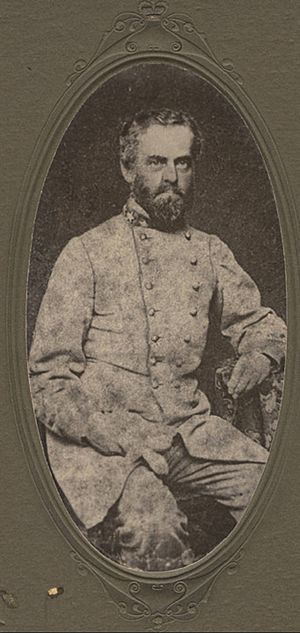Alexander McKinstry facts for kids
Quick facts for kids
Alexander McKinstry
|
|
|---|---|
 |
|
| 3rd Lieutenant Governor of Alabama | |
| In office November 17, 1872 – November 24, 1874 |
|
| Governor | David P. Lewis |
| Preceded by | Edward H. Moren |
| Succeeded by | Robert F. Ligon |
| Personal details | |
| Born | March 7, 1822 Augusta, Georgia |
| Died | October 9, 1879 (aged 57) |
| Resting place | Magnolia Cemetery Mobile, Alabama |
| Political party | Republican |
| Spouse | Virginia Thompson Dade |
| Military service | |
| Allegiance | |
| Branch/service | |
| Rank | Colonel |
| Unit | 32nd Regiment Alabama Infantry |
| Battles/wars | American Civil War |
Alexander McKinstry (born March 7, 1822 – died October 9, 1879) was an important politician in Alabama. He served as the third Lieutenant Governor of Alabama. A member of the Republican Party, McKinstry worked alongside Governor David P. Lewis from 1872 to 1874. He was the last Republican to hold the Lieutenant Governor position for 125 years.
Contents
About Alexander McKinstry
Alexander McKinstry was born in Augusta, Georgia. When he was fourteen, he moved to Mobile, Alabama, to live with his relatives.
Early Career and Law
McKinstry took on various jobs to support himself. He started reading law, which means he learned about law by studying and working in a law office. He worked for John Archibald Campbell, who later became a judge on the Supreme Court of the United States.
Soon after, McKinstry was allowed to practice law. This is called being "admitted to the bar." He began his law career in Mobile County.
Military Service and Judgeship
In 1847, McKinstry was elected as a colonel in Alabama's state militia. A militia is a group of citizens who can be called upon to serve as soldiers, similar to a local defense force. He served for three years before returning to Mobile.
After his military service, McKinstry became a judge for the city of Mobile. He held this position until 1860.
The American Civil War
Over the next few years, McKinstry served in several military roles. He was a colonel in the 32nd Regiment Alabama Infantry during the American Civil War. After the war ended in 1864, he went back to his law practice.
Entering Politics
In 1865, McKinstry decided to get more involved in politics. He was elected to the Alabama state legislature. There, he became the chairman of the judiciary committee. This committee helps to create and review laws related to the justice system.
In 1872, McKinstry was elected as the third Lieutenant Governor of Alabama. This was a very important role. In February 1873, he used his knowledge of parliamentary rules to manage a disagreement in the state senate. He ran for Lieutenant Governor again in 1874, but his party lost the election that year.
 | James B. Knighten |
 | Azellia White |
 | Willa Brown |

